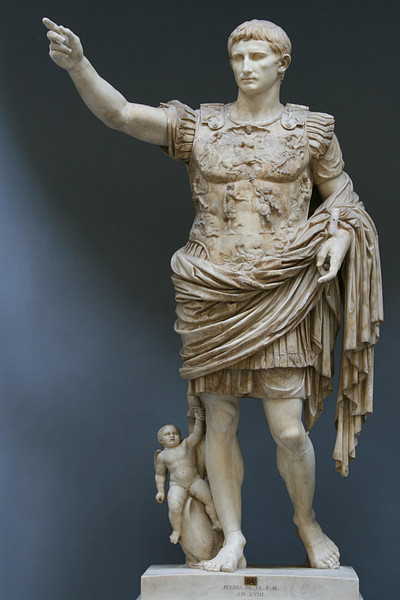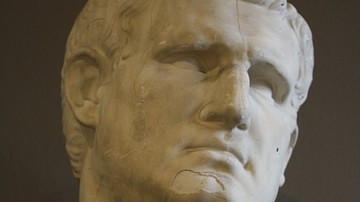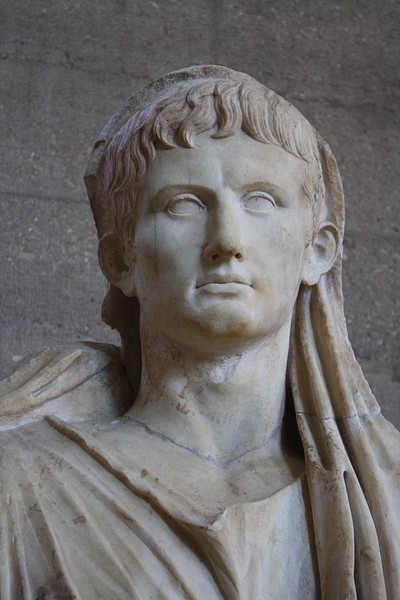
Augustus Caesar (27 BCE - 14 CE) was the name of the first and, by most accounts, greatest Roman emperor. Augustus was born Gaius Octavius Thurinus on 23 September 63 BCE. Octavian was adopted by his great-uncle Julius Caesar in 44 BCE, and then took the name Gaius Julius Caesar. In 27 BCE the Senate awarded him the honorific Augustus ("the illustrious one"), and he was then known as Gaius Julius Caesar Augustus.
Owing to the many names the man went by in his life, it is common to call him Octavius when referring to events between 63 and 44 BCE, Octavian when referring to events between 44 and 27 BCE, and Augustus regarding events from 27 BCE to his death in 14 CE. It should be noted, however, that Octavian himself, between the years 44 and 27 BCE, never went by that name, choosing instead to align himself closely with his great uncle by carrying the same name; a decision which prompted Mark Antony's famous accusation, as recorded by Cicero: "You, boy, owe everything to your name".
Augustus, Mark Antony & Lepidus
After Julius Caesar's assassination in March of 44 BCE, Octavian allied himself with Caesar's close friend and relative, Mark Antony. Together with another supporter of Caesar, Marcus Aemilius Lepidus, Antony and Octavian formed the Second Triumvirate in October of 43 BCE. Their first order of business seems to have been the systematic killing of any political rivals and supporters of Caesar's assassins. Exactly which of the three was most responsible for the killings is disputed by ancient and modern writers alike with some claiming Octavian innocent and others ascribing to him the most bloodshed. Having cleansed Rome of the 'bad blood' of their opposition, the Second Triumvirate then turned their attention to Caesar's assassins. At the Battle of Phillipi in October 42 BCE, the forces of Brutus and Cassius were defeated by those of the Second Triumvirate forcing both assassins to kill themselves.
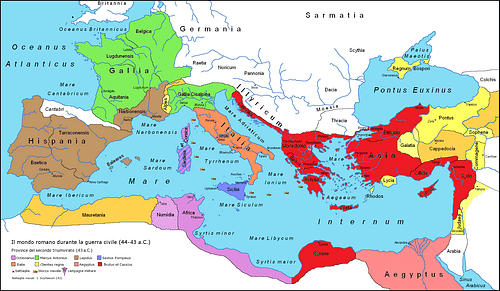
Between 38 and 36 BCE, Octavian and Lepidus battled Sextus Pompeius (son of Pompey Magnus, Julius Caesar's great rival) for rule of Rome with Antony lending aid from Egypt. The Second Triumvirate was victorious over Pompeius, and Lepidus, glorying in the triumph and confident of his strength, insulted Octavian by ordering him to leave Sicily, the theatre of operations, with his troops. Octavian, however, offered Lepidus' troops more money than Lepidus could pay and his army defected to Octavian. Lepidus was stripped of all his titles save Pontifex Maximus and the Second Triumvirate came to an end.
Augustus, Antony & Cleopatra
During this time, however, relations between Octavian and Mark Antony began to deteriorate. In 40 BCE, in an effort to solidify their alliance, Octavian had given his sister, Octavia Minor, in marriage to Antony. Antony, though, had allied himself closely with Cleopatra VII of Egypt (the former lover of Julius Caesar and mother of his son Caesarion) and, in fact, had become her lover. Octavian charged that Antony had misused his sister when Antony divorced Octavia in favor of Cleopatra in 33 BCE which prompted Antony to write Octavian, “What's upset you? Because I go to bed with Cleopatra? But she's my wife and I've been doing so for nine years, not just recently. Does it really matter where, or with what women, you get your excitement?”
To Octavian, Antony's behavior in the east, both in private, politically and militarily, was intolerable. He forced the priestesses of the temple of Vesta in Rome to surrender Antony's will and had it read in the Roman Senate. The will gave away Roman territories to Antony's sons and contained directions for a great mausoleum to be built in Alexandria for Antony and Cleopatra, among other stipulations which Octavian felt threatened the grandeur of Rome and branded Antony a renegade.
Among the worst of Antony's offenses was his declaration that Caesarion was the true heir of Julius Caesar, not Octavian. The Senate revoked Antony's consulship and declared war on Cleopatra VII. At the Battle of Actium on 2 September 31 BCE Octavian's forces, under the general Marcus Agrippa, defeated the combined forces of Antony and Cleopatra, scattered them (many had already defected to Octavian's side before the battle) and pursued the survivors until 1 August 30 BCE when, after the loss of Alexandria, Antony and Cleopatra killed themselves. Octavian had Caesarion strangled (stating that “two Caesars are one too many”) and Antony's eldest son executed as a possible threat to Rome.
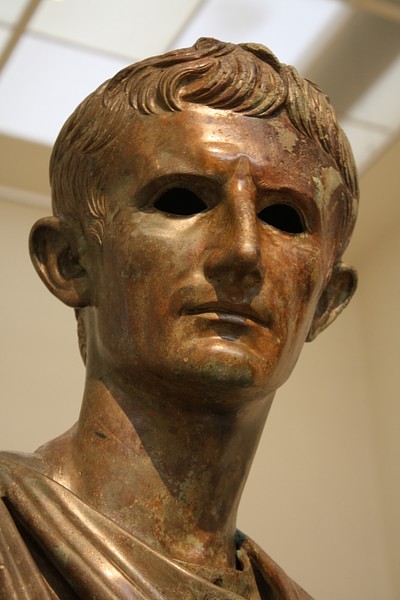
Octavian was now the supreme ruler of Rome and all its territories but, in order to keep from making the same mistake his adoptive father had of seeming to covet power, Octavian was careful to characterize all of his political stratagems as being for the good of the Roman Republic. In January of 27 BCE, Octavian resigned his powers humbly only to receive them back from the grateful Senate who also bestowed upon him the title Augustus. Octavian was careful not to refer to himself by that title at any time in public, simply calling himself 'Princeps', or, First Citizen. So carefully did Octavian play the political game in Rome that his claims to restoration of the Republic seemed in earnest, even when he gained supreme power, giving him absolute control over Rome and its colonies.
Augustus as Emperor
Popular already with the soldiers of his army, the title Augustus solidified his power in the provinces as Imperator, or commander-in-chief (from which the English word 'emperor' is derived). The month of August was named in his honor. In the year 19 BCE, he was given Imperium Maius (supreme power) over every province in the Roman Empire and, from that time on, Augustus Caesar ruled supremely, the first emperor of Rome and the measure by which all later emperors would be judged. By 2 BCE Augustus was declared Pater Patriae, the father of his country.
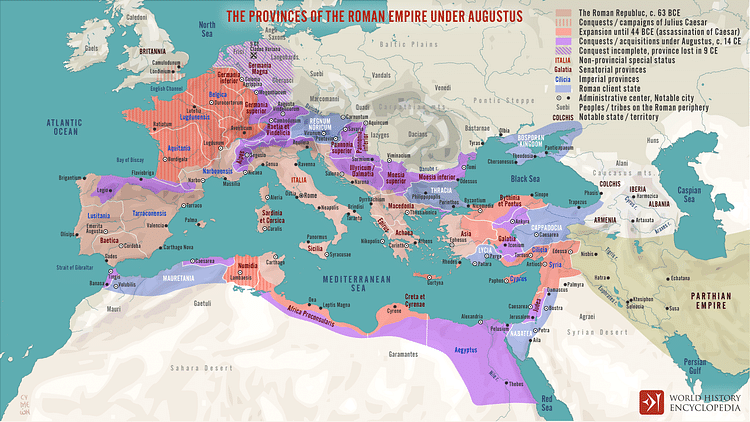
The era of Augustus' reign was a golden age in every respect. The peace which Augustus restored and kept (the Pax Romana) caused the economy, the arts and agriculture to flourish. An ambitious building program was initiated in which Augustus completed the plans made by Julius Caesar and then continued on with his own grand designs. In his famous inscription Res Gestae Divi Augusti (The Deeds of the Divine Augustus) he claims to have restored or built 82 temples in one year. The famous public Roman baths were constructed under Augustus by his second-in-command, Agrippa, and the poet Virgil composed his epic the Aeneid. Augustus took great personal concern in the arts and was a personal patron of many artists.
He passed many sweeping reforms as well as laws to maintain stability in marriage and to raise the birth rate in Rome, making adultery illegal, offering tax incentives to families with over three children and penalties for childless marriages. So strictly did Augustus himself adhere to his laws that he banished his own daughter, Julia, and his granddaughter, for adultery.
Death
Augustus died at Nola in 14 CE. His official last words were, “I found Rome a city of clay but left it a city of marble” which aptly describes Augustus' achievements during his reign as emperor. According to his wife Livia Drusilla and his adopted son Tiberius (r. 14-37 CE), however, his last words were actually, “Have I played the part well? Then applaud as I exit.”
Augustus' body was brought back to Rome, and on the day of the funeral, all businesses in Rome closed out of respect for the emperor. He was succeeded by Tiberius who he had adopted in 4 CE and who read the eulogy (along with his own son, Drusus) at Augustus' famously grand funeral. The emperor's body was cremated and his ashes interred in his mausoleum. Augustus' death was mourned as the loss of a great ruler of immense talent and vision, and he was proclaimed a god among the host of the Roman pantheon.
